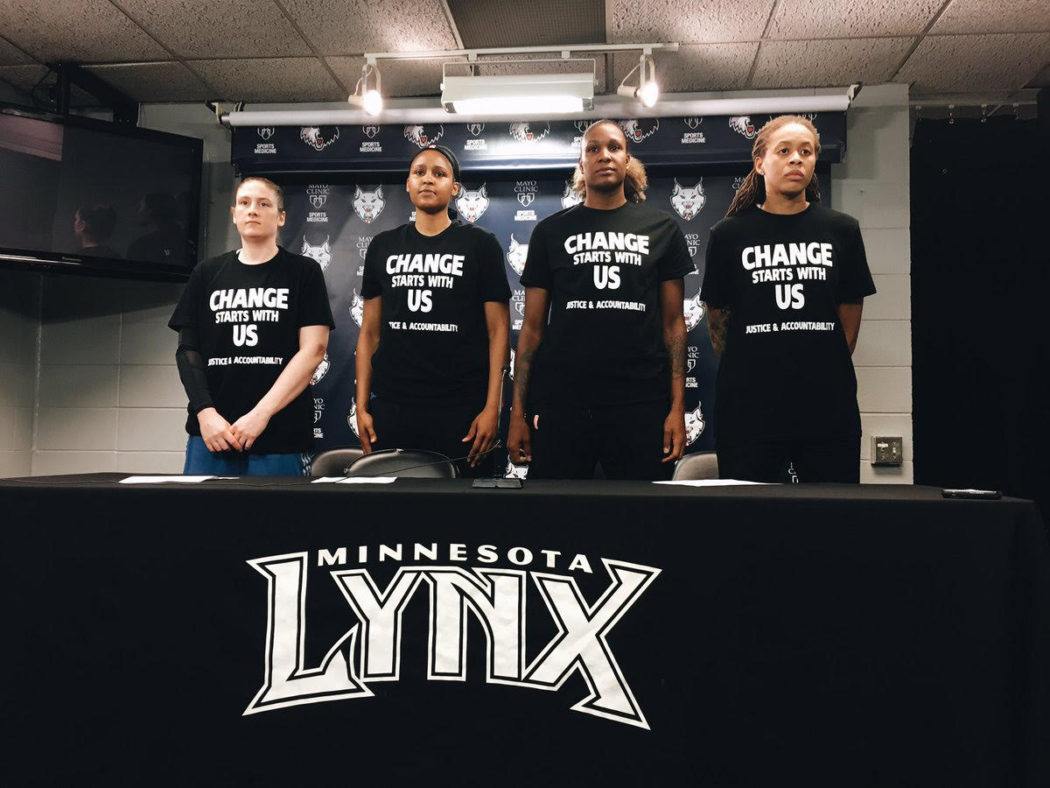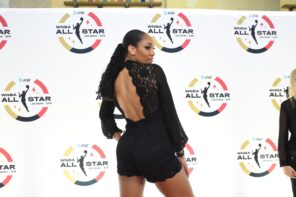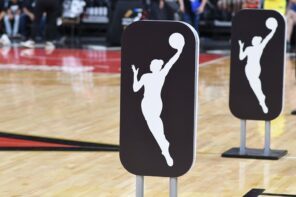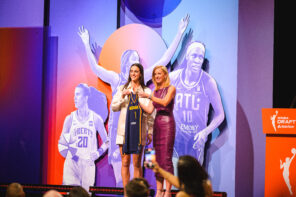One of the most common lexicons we hear in our human vernacular is “A House Divided Against Itself Cannot Stand.” Well…what if that house was erected on a flimsy (and uneven) foundation from the outset?
If there was ever a time not to “stick to sports,” now is that time. To be critically honest, sports is probably the furthest thing from people’s minds right now even with leagues (including our beloved WNBA) discussing plans for restarting their seasons in socially sequestered realms.
The truth, though, is the American sporting landscape is such a microcosm for society at large. Look at how male sports consistently amass more media coverage and sponsorship dollars than their woman counterparts. Look at how whenever a LeBron James, Colin Kaepernick, Breanna Stewart or Brittney Griner speak out against systemic injustice, they are told to “stay in their lanes” because it goes against society’s ingrained norms regarding race and sex (norms that were set in place by older white men).
Look at even how the names of the recently deceased have been covered. The name (rightly) on everyone’s lips is George Floyd, a former Houstonian who was killed at the hands of Minneapolis police officers. We mention what happened to Ahmaud Arbery in Brunswick, Georgia – he was killed for jogging while Black.
And while we must definitely highlight the systemic injustices that led to their untimely demises, we need the same energy for Breonna Taylor, who was killed by police in Louisville while in her sleep. Black Lives Matter – whether they are men, women or children.
Why do these atrocities keep being committed? Because for far too long, we have been afraid of our own shadow. For far too long, we as a society have been afraid of having true and honest conversations regarding systemic racism, systemic sexism and systemic homophobia just as we as a sporting populace have been afraid of having true and honest conversations on how we see athletes who happen to be Black women (aka the majority of WNBA players).
Venus and Serena Williams are legends of the tennis realm and have no problem landing endorsement deals and they still receive sexist treatment from the hegemonic forces within tennis that saw Maria Sharapova as “more marketable” than the Williams sisters.
When we watch any sporting event (not just women’s basketball) why are there not a flurry of commercials featuring a Skylar Diggins-Smith, Liz Cambage, Candace Parker, Nneka and Chiney Ogwumike, Angel McCoughtry, Breanna Stewart, Sue Bird or Elena Delle Donne? Find us a Madison Avenue suit who tells us none of those aforementioned players are marketable and we will tell them to cover up because their Litchfield County is showing.
Have there been gains made by African-American athletes (as well as their Hispanic, Asian and Native American counterparts)? Yes. Have there been gains by African-Americans in society at large as well as their Hispanic, Asian and Native American counterparts? Yes. But highlighting those steps forward toward a more just, fair and inclusive sporting populace as well as a society at large should not shy us away from why we have not made more gains in these areas.
What has to bring hope is what we are seeing around the country at protest after protest after protest. It is not only Black people marching in support of Black lives. We are seeing white people as well at these rallies and these rallies are mostly comprised of young, energetic, ambitious Americans of all races who want to have this conversation and believe we are long overdue to have this conversation on how race shapes almost everything in society.
The only thing that has to be said to the white allies is to have those conversations within their own households too. Because no one is born racist just as no one is born sexist. Racism is something that is learned and passed down from generation to generation.
To truly address a problem, one has to get to the root of the issue. The ills of racism, sexism and homophobia are almost entirely taught inside the homes of white communities. Meaning that is where those conversations on unlearning racism need to take place – inside the homes of white communities.
And those conversations should include why do people believe they have superiority over others because of the color of their skin or what their religion tells them. Those conversations may even include the uncomfortable reality that they have to confront and reckon with their own family histories because someone who is likely a racist probably learned it themselves from their ancestors.
And if those conversations lead to how racism, sexism and homophobia involve sports, they should include why some families will encourage their young girls to want to cheer from the sidelines instead of getting in the game (as well as encouraging young boys that if they want to delve into something as counter-hegemonic as cheer, that is okay and should be encouraged). Tell your young girls that there is nothing wrong with wanting to pick up the basketball or a hockey stick instead of the pom-poms … and give those pom-poms to their brothers.
Trust us when we say those conversations likely will be uncomfortable, tense, heated and there will probably be some four-letter words exchanged. They are exactly why they need to take place.
And the conversation that needs to take place in sports boardrooms (physical and virtual) is why more an emphasis is not placed in lifting up the voices of Black woman athletes whose last names are not Williams and whose first names are not Venus or Serena. And why more of an emphasis is not placed on investing real money into women’s sports.
Look at how much money was been flushed down the drain on the AAF and XFL 2.0. Our guess is if that money was put into the WNBA, NWSL, NWHL and National Pro Fastpitch, there would be a much bigger return on the investment. Why do financial power brokers believe that they will not get a return on the investment if they were to invest in women’s sports when all of the evidence screams at them that they will. Is it because they know this and they do not want to confront why they are wrong? Or is it simply because they believe what Ronald Reagan’s people believed in the 1980s that Title IX was the “Lesbians’ Bill of Rights.”
American society (as should all societies) should use this as an opportunity to be honest with why it makes things more difficult for Black individuals … and why they are twice as difficult for anyone who is a Black woman. For some, things have become doubly uncomfortable as the country is forced to confront racial biases in addition to a virus that still has yet to be contained.
That is exactly why those conversations must be had because nothing will get done as long as the white elephant(s) in the room continues to be ignored and the can continues to be kicked down the road. The protests we are seeing suggests that that road that said can has been kicked down since the 1600s has reached a dead end.
This means confronting racism, sexism, homophobia and overall injustice in all walks of life – and sports are included in that. The images we are seeing in the streets of cities and towns around the world indicate that our country’s youth (of all ages) is particularly ready to have this addressing with our elders.
They also understand that this is a conversation that will not be here one night and gone the next. This means forcing America to look at itself in the mirror and telling it when it looks at itself up close, she needs a new hairstyle, eyelashes, eyeshadow, lipstick and facewash – the works.
“What if America loved Black people as much as they love Black culture?” is an important question to ask as we have this conversation. Another one can also be asked: “What if America loved Black athletes as much as it loves Black sports?” Hip-Hop is the most popular genre of music in the U.S., particularly among our young. The majority of NBA and NFL players are Black and the masses eat those sports up like candy. And movies with diverse casts are successes at the box office. Ask Crazy Rich Asians. Ask Black Panther.
An important shift we are seeing in this age of social media are influences of all races being less afraid to say they are willing to lose fans or followers if they are racists. Today’s athletes understand that true fans are those who admire them not only for their ability to shoot 3-pointers and dunk the ball, but also for who they are away from the field of play. Do not only be a fan of that person when she or he is wearing your team’s colors but when she or he is in street clothes as well.
We are told all the time that change is something we are scared of because we do not know what it will look like on the other side. The issue with that is simple – those that are scared of change typically are flawed individuals with a narcissistic streak. People who are willing to change are willing to grow because they do not shy away from their flaws, but embrace them and acknowledge them to become better individuals – better leaders, better teammates, better coaches, better friends, better spouses, better family members.
Better people.
Just as it has been time for the sports world to listen to our women influencers and those of color, it is time for this country to have its own listening session.
America, open your ears. Listen to, embrace and accept change. You will be better off for it.
.@DianaTaurasi standing with those who continue to fight the good fight. This speaks volume 🗣 https://t.co/R9Kveb6DhQ
— Made for the W (@madeforthew_) June 6, 2020
Going to make a thread of female athletes at #BlackLivesMatter protests, because so many are taking action.
Here’s @breannastewart and @jewellloyd in Seattle. https://t.co/ofciIGPSEh
— Lindsay Gibbs (@linzsports) June 6, 2020
What the sign says ✊🏽 (via @T_Cloud4) pic.twitter.com/DqZ3uK3RQy
— WSLAM (@wslam) June 6, 2020
Liz leading protests in Melbourne, Australia. 🖤 @ecambage pic.twitter.com/enfrqn6XNT
— WSLAM (@wslam) June 6, 2020





